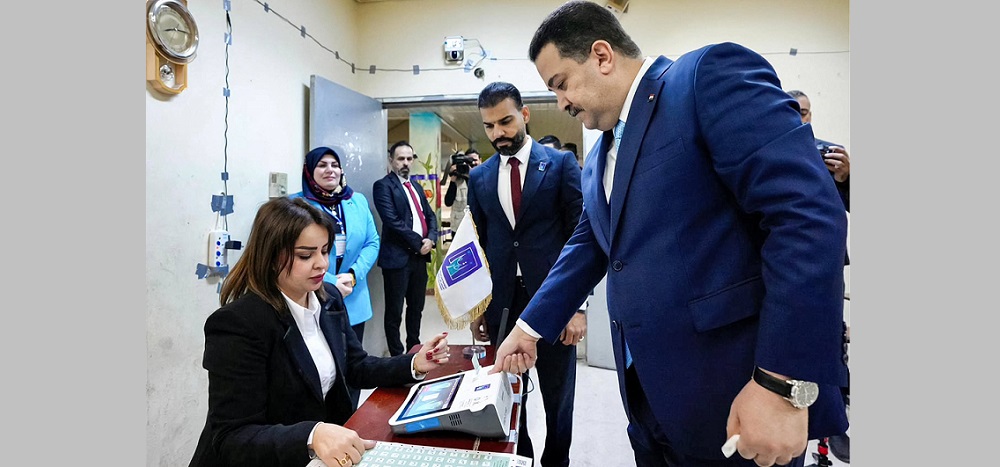This election came 10 years after it was held for the first time in 2013. The delays took place as in 2017 the government of Prime Minister Heydar al-Abadi dissolved the provincial councils.
This election captured interest of Iraqi citizens, government, political parties and factions for months, something showing importance and high sensitivity of its results.
The provincial councils have powers granted by the 2005 Iraqi constitution, the most important of which are the election of the governor and provincial executive officials and heads of departments, the power to dismiss them, the issuance of local laws provided that they do not conflict with federal laws, and the approval of service projects based on the funding allocated to the province by the central government. These councils are the legislative and supervisory authority in each province and are not under the control or supervision of any ministry or NGO.
In this year’s election, 134 political alliances and lists with 5898 candidates raced for seats. The turnout rate was reported 41 percent and 16 million citizens were eligible to vote.
Independent High Electoral Commission (IHEC) figures suggested a decrease in turnout compared to 2013 election (with 51 percent participation) and 2021 general election (with 44 percent).
But since elections are always the most important and easiest ways to gauge the weight of political parties and alliances in the political competition, a look at the results can provide a picture of the latest composition of the political factions in the power game before the snap parliamentary elections with whose holding Prime Minister Mohammed Shia al-Sudani is tasked. Additionally, the results can chart a roadmap for future of political alliances to pave their way to the next parliamentary election.
Surprises by al-Halbousi and resistance forces
The results of provincial councils bore some surprises, with the most strident of them being the victory of Progress Party led by Parliament Speaker Mohamed al-Halbousi who last month was ousted by a Supreme Court ruling following a complaint filed against him by an MP for violating legal duties and forging signatures of judicial officials.
The top gainers in addition to Progress Party were ‘We Construct Alliance” which consists of political branches of most of the factions of the Shiite parties affiliated with resistance forces, and State of Law Coalition led by ex-PM Nouri al-Maliki.
The Progress Party ranked first in Baghdad with over 132,000 votes, followed by We Construct Alliance that harvested 131,000 votes, and State of Law with 130,000. As a result, all three parties won 9 seats in the Baghdad provincial Council, but in total, the Shiite Coordination Framework (SCF) took the lead in the recent elections with three electoral lists, boosting its power in this country of 43 million population.
In the meantime, the attention-grabbing point is that al-Halbousi’s decisive victory certainly presented the traditional Sunni forces with a serious challenge in regaining their position in Sunni areas, where local elections are mainly based on loyalty and tribal affiliations and factional interests.
Al-Halbousi’s party in Anbar province, the stronghold of Sunni Arabs in Iraq, won 12 out of 16 seats and in Baghdad, the capital of the country, won the first place with 9 out of 49 seats, leaving behind the rival Sunni alliance Jamahir Al-Wataniyah led by Ahmad Al-Jubouri, Azem alliance led by Muthana al-Samaraee, and National Resolution Alliance led by Defense Minister Thabet al-Abbasi.
Political Experts believe that the elections of the provincial councils portrayed al-Halbousi as the undisputed leader of the Sunnis in Iraq though he was expected to be removed from the Iraqi political scene for some time after he was removed from his parliamentary post and prominent Sunni figures dispersed from around him.
Youths turnout rate increase
Another important issue was certainly the widespread disapproval of the Sadrist Movement’s request to boycott the elections. The turnout shows a very small difference from the rate of 2022 parliamentary election.
Following walkout of 73 members Saerun bloc from the parliament in June 2022, Sadrist Movement’s leader Muqtada al-Sadr isolated himself from politics, announcing that would be permanent retirement. However, Sadrist leaders launched their election boycott campaign to take the steam out of election enthusiasm and later question its legitimacy.
Now despite the not so heated turnout, with backing of top Iraqi Shiite cleric to the local elections people have an positive look at the performance of the ruling factions.
While the Sadrists lost the posts of governor of Maysan and Najaf as a result of boycotting the elections, the SCF won in Maysan province with lead of Asaib Ahl Al-Haq faction and is expected to take Najaf, too.
Additionally, since the provincial council election is the gate to parliament, the recent election displayed a growing willingness of youths and nascent groups to engage in political process. Also, the traditional parties had developed an appetite for fresh young forces to make the main party representatives more familiar with the needs of local communities, investment in small projects and start-ups, and employment.
Kurds make gains in Kirkuk
Another significant issue in recent Iraq vote is the successful arrangement of election in Kirkuk after nearly two decades with the highest national turnout rate of 66 percent.
The oil-rich Kirkuk with a mixed population of Kurds, Arabs, and Turkmens is a province that has been a source of dispute between central government and Kurdistan local government in northern Iraq. The first elections in Kirkuk were held in 2005, and since then no provincial council elections have been held in this province.
In last week election, Patriotic Union of Kurdistan took the lead, followed by Rakan Al-Jubouri-led Arab alliance, Turkmen list, and Kurdistan Democratic Party.
At the end, it is obvious that the provincial elections have not
caused a major change to the political map of interaction of the key
Shiite and Sunni forces in Iraq, as these forces managed to retain their
electoral weight in the provinces without substantial changes.
/129

